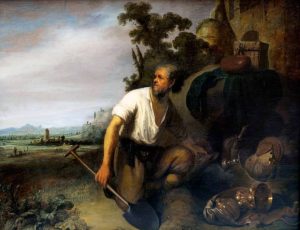What Do You Want?
17th Sunday of Ordinary Time (A)
click here for readings
Have you ever imagined what you would do if you found a magic lamp with a genie who would grant you three wishes? Here is a chance to get whatever your heart desires. What do you wish for? You can’t wish for more wishes (that never turns out well in the stories). You don’t want to wish for anything too mundane, like a new car or a nice vacation. You want to reach for the stars. Maybe you’d wish to be wealthy enough to never work a day in your life. Or maybe you’d wish for super powers, like teleportation or telekinesis. Those would be pretty cool abilities to have. Perhaps you’d be more altruistic and wish for world peace or a cure for cancer.
Of course this is fantasy. You aren’t going to find an old lamp at a yard sale and discover a blue Robin Williams inside to make your dreams come true. But it’s interesting to think about. Thinking about what you would wish for can help you to see what your priorities really are.
In the Old Testament reading for this Sunday’s Mass, King Solomon is given such an opportunity. God appears to Solomon in a dream and says, “Ask something of me and I will give it to you” (1 Kgs 3:5). What an opportunity! Solomon is given a chance by God to have anything that he wants. He could ask for more wealth or power. He could ask for peace and prosperity for his kingdom. But interestingly, he asks for none of these things. Instead, Solomon reflects on what God has already given him. God has made him king over Israel. But Solomon does not feel worthy of such great responsibility. Recognizing that God has given him a special calling, Solomon asks for what he needs to meet the obligations of his vocation.
Give your servant… an understanding heart to judge your people and to distinguish right from wrong.
Solomon asks for the wisdom to know right from wrong. He asks to understand how God wishes us to behave toward Him and toward one another.
I am reminded of another holy man who was given a similar opportunity by the Lord. St. Thomas Aquinas was a teacher and a priest in the Dominican order, who wrote great theological treatises which continue to be studied today. His magnum opus is the Summa Theologica. It is a masterpiece of philosophy and theology and remains one of the most influential works of Western writing.
It is said that after writing about the Passion and Resurrection of Christ, St. Thomas went into the university chapel to pray. From the crucifix above the altar, Thomas heard a voice call out to him. “You have written well of me, Thomas. What would you have as your reward?”
Thomas replied, “Nothing but Yourself, O Lord.”
That story has always moved me. St. Thomas could have asked God for anything at all, even something virtuous, like Solomon asking for wisdom. St. Thomas could have asked for any number of good, or even great things. Instead, Thomas illustrated that he already possessed true wisdom by asking for the greatest thing of all — God Himself. Thomas desired only God because he knew there is nothing greater.
I think about this story from time to time when the priorities in my own life seem off. I ask myself, “What do I want — really?”
Someone recently observed that though everyone says they want to go to heaven, most people don’t act like it. We don’t pay attention to spiritual realities. We don’t pray. We don’t strive for holiness. We may say with our lips that we want to be with God, but we say over and over again with our actions that we’d rather live our lives without His interference. I’m sure most of us can relate.
Some might suggest that we place too high a value on the things of this world — worldly power, pleasures and comforts, and our selfish inclinations. But it’s not necessarily that we value worldly things too much. It’s that we value God too little.

In this Sunday’s gospel (Mt 13:44-52), Jesus wants us to understand how valuable a right relationship with God truly is. He compares God’s kingdom to a treasure buried in a field worth so much that if you found it, you’d sell everything you own just to buy that field. He also compares God’s kingdom to a pearl of such great price that, again, you’d sell everything you own just to buy that pearl.
These parables are not complicated. The only reason you’d sell everything you own to buy something else, is if that something else is worth more than everything you own. But of course the treasure Jesus offers is not a field with buried treasure or a pearl of great price. It’s something infinitely more valuable. It’s the kingdom of God.
So why should we value God’s kingdom so much?
It all comes down to a pretty simple question. What do you want? I’m not talking about money or fame. I’m not talking about getting into grad school or meeting Mr. or Mrs. Right. And I’m not even talking about altruistic things, like finding a cure for cancer or solving world hunger or even the generic, “I just want to make a difference.” Those are all good things. But what I’m getting at is much more basic. What do you really want?
If we are honest with ourselves, and really look inward at our deepest and most heartfelt desires, we would discover that these outward things don’t matter as much as we think they do. Money. Getting into a good school. Getting a good job. Finding a good spouse. Finding a way we can make a difference in the world and contribute to society. These are all good and important things. But none of them are the greatest thing.
If we are totally honest with ourselves, and think about what we truly desire at the most basic level, each of us would come up with a list that looks something like this.
- I want to be happy.
- I want to be a good person.
- I want to be loved.
- I want to love others better than I do now.
You can’t buy any of those things at WalMart. You can’t order them with free 2-day shipping on Amazon Prime. No college degree or job title is a guarantee of having any of those things. But most people, I’m willing to bet, would give anything to have what’s on this list. Because at the end of the day, this is all most of us really want.
And here’s the good news. We can have them. Being part of the kingdom of God means just that. It means knowing you are loved by God, who is Love. It means extending that love and forgiveness to others. It means following the will of the One who made us and so of course knows the best way for us to live. Following God’s will makes us better people. God is our author. He designed and created humanity. It only follows that if we listen to His plan for us that we’d become better at being human! And that will naturally lead to our happiness, because we’ll finally be living the way we were always meant to live.
This is why the psalmist can say (Ps 119), “Lord, I love your commands.” Most of us don’t like being commanded to do things, but we should love God’s commands, because they help us learn who we truly are and how we ought to live. So the psalmist rightly says God’s words “are more precious than thousands of gold and silver pieces.” God’s law is more valuable than any earthly treasure.
What Jesus offers is infinitely better than buried treasure or a wish granting genie. He offers us the only path to true happiness. He offers us a chance to know God, and in doing so to finally know ourselves.

